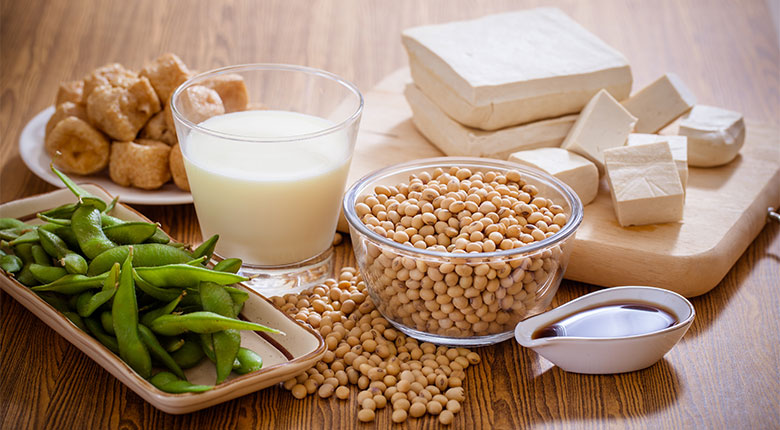
Soy - not for vegans (or women) only
Share
Are you also one of those who believe that carbohydrates are life? So you are right! Absolutely right.
But... what if we tell you that there are carbohydrates that harm us and there are carbohydrates that will make our lives longer and us slimmer and healthier?! And no! Unfortunately, these are not the well-known and beloved carbohydrates - pasta and rice, but rather higher quality, more useful and healthier carbohydrates - so healthy that the United Nations, in its honor and by itself, dedicated the year 2016 to them as their year in order to encourage a healthy diet. Get them: the legumes!
And just as thirty is the new twenty, so are legumes the new carbohydrates! And you should very much enrich your diet with them. And since the page is too short to contain all the benefits of all the legumes that exist in nature, we chose to focus this time on one legume, small but so "big", and with a huge contribution to our body - the perfect legume: the soy!
Soy came to us straight from the Far East, where it was used for thousands of years, and is still used as a basic food when its consumption per person is estimated there in the amount of about 3 servings of soy per day, where soy cream is, for example, 100 grams of tofu, a glass of soy milk or a glass of green soy beans.
The soy can be consumed in many and varied forms so that we will not be bored:
- The soy in its natural and basic form - green beans ! With the addition of salt and lemon, which can be a wonderful and healthy snack or a first course.
- Tofu - which can be eaten raw or fried in a little olive oil or sautéed with the addition of coconut milk and vegetables.
- Tempeh, natto and miso - all of these are fermented soybeans.
- Soy milk - which is an excellent milk substitute due to the large amount of calcium in it (you will immediately argue...) for both vegans and those suffering from lactose sensitivity.
- And finally - soy sauce , which, despite being the most common product in the kitchen, is less and less recommended for consumption due to being an industrial and processed product that undergoes hydrolysis (a chemical process in which a molecule is divided into two parts (ions) when it reacts with a water molecule) (which is also suspected of containing carcinogenic substances.

A series of studies in recent years have found a host of benefits for this super legume and these are:
Soy and cholesterol - a review of dozens of studies published as early as 1995 in an English medical magazine found that consuming soy lowers the level of "bad" LDL cholesterol and the levels of triglycerides (fats) in the blood.
Soy and diabetes - in some studies it was found that soy balances blood sugar levels and therefore helps reduce the risk of diabetes in adults. The researchers found that the isoflavones found in soy in very large quantities (details below) encourage the development of fat cells through a receptor that mediates an effect on insulin similar to the action of antidiabetic drugs.
Soy and weight loss - a relatively new study, published in 2012, found that soybeans of a specific variety that is rich in a component known as beta conglycins inhibit the accumulation of fats in the fat cells in our body and can help with weight loss as well as "on the way" to reduce inflammatory processes in our body.
So what is in soy that is considered a superfood, and in our rich language - superfood?
- Complete protein - soy protein contains all 9 essential amino acids for humans and in the right proportions for the human body. The human body cannot produce these essential amino acids on its own, so they must be obtained from food. Contrary to the popular approach that soy is a food that is a substitute for meat and is therefore suitable for vegetarians/vegans, soy is more than recommended for omnivores as well, and especially for those who want to increase their amount of protein in order to increase muscle mass and get fit. The soy protein is almost the only protein among the other legumes that is considered a complete protein and therefore its value does not decrease the value of animal protein.
-
Dietary fiber - the dietary fiber found in soy in large quantities (5.6 grams per 100 grams) is basically sugar. But… the good kind of sugar. Dietary fiber consists (mostly) of a chain of glucose (a monosaccharide) when our body does not have the enzyme that breaks it down (unlike animals), so it reaches the large intestine as it enters plus other "bonuses", some of which it collects on its way out of the digestive system, such as liquids, for example, or calories, so the fiber itself really helps with weight loss and a long-lasting feeling of satiety. Also, the consumption of dietary fiber lowers the risk of colon cancer, cholesterol, diabetes, hypertension and heart disease.
- Calcium - in soy you can find a large amount of calcium - 178 milligrams of calcium per 100 grams of soy. This figure does not fall short of the amount of calcium found in cow's milk: 180 milligrams per 100 grams of milk. Calcium, an essential mineral for our bodies, is known for its many and essential benefits for the body from infancy to the third age - as a help with insomnia and high cholesterol, miraculously improves the strength of the bones in the body, the strength of the teeth, the hair and the appearance of the facial skin.
- Isoflavones - more popularly known as 'phytoestrogens' - plant components that act like the female hormone estrogen. Soy is the food that contains the most phytoestrogens, some of which have antioxidant activity that helps our bodies fight free radicals and slow down aging.
Click Here for Gluten Free , Vegan Protein Drink Mix made of Soy
Click Here for Formula 1 Protein Shake Mix made of Soy (multiple favors)
Beyond these components, soy also contains other valuable nutritional components: B vitamins, vitamin K, and vitamin C, which is known as a very powerful antioxidant and strengthens our immune system. As for essential minerals for our bodies, soy can be found in large amounts of iron, manganese (a mineral that contributes to metabolism), phosphorus, copper, potassium (which is found to greatly help weight loss following a study by Ichilov Hospital published in 2019), magnesium, zinc and selenium.
